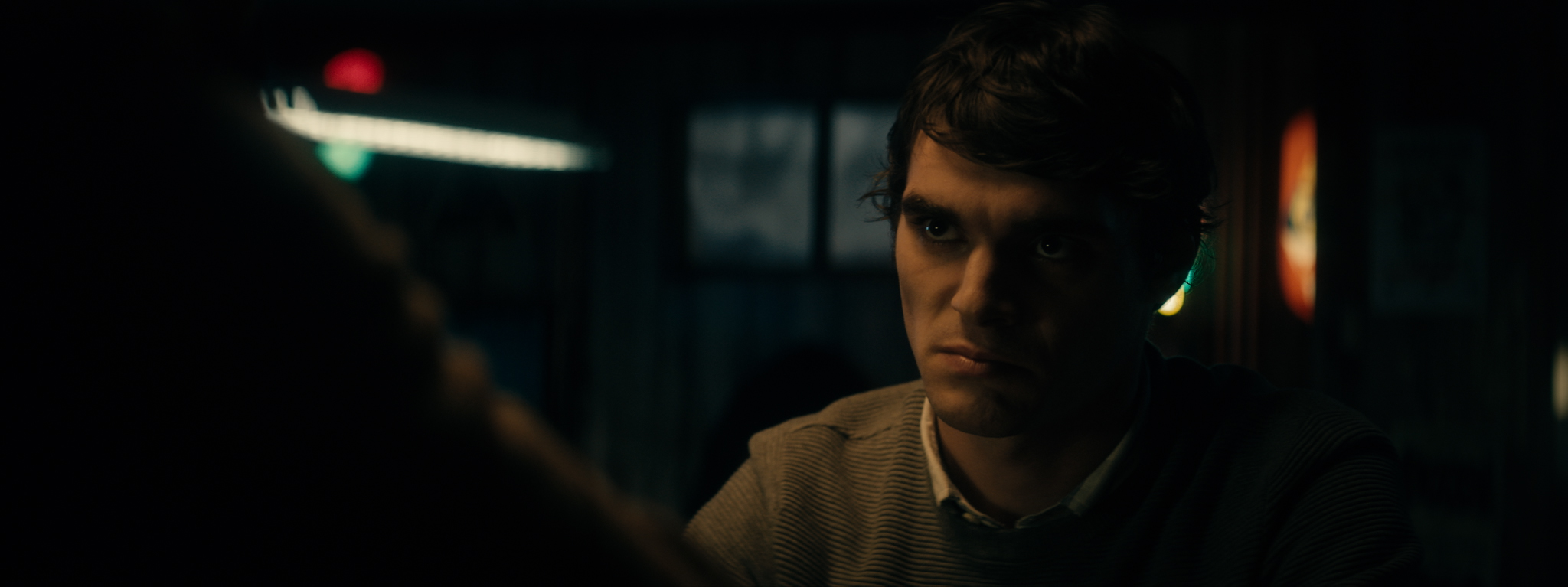A noir-inflected thriller about our desperate need to weave an ordered narrative from the chaos of life, director Cody Calahan’s latest film The Oak Room is a labyrinth mystery concerned with the stories we tell about ourselves and others. Our Culture reviews the film here as part of its selection for the 2020 Fantasia International Film Festival.
On a stormy night in a rural Canadian town, Paul (Peter Outerbridge) is closing up his bar for the night when Steve (RJ Mitte) walks through the door. Paul hasn’t heard from Steve – the son of his recently passed customer and friend, Gordon (Nicholas Campbell) – in several years, but that doesn’t mean he’s pleased to see him again. For one thing, Steve owes him money. But instead of presenting him with cash, Steve offers Paul a story – about another bar, another bartender and another customer coming in from the snow after closing time. Paul has a few stories for Steve, too, and even the characters within their tall tales have yarns to spin – and all of these narratives turn out to be tinged with darkness as they reach their conclusions.
The problem with reviewing a film like The Oak Room is that it is a movie best seen blind (which is perhaps why its trailer perfectly captures its tone but struggles to give any real sense of its content). Pitched somewhere between the Coen brothers, early Christopher Nolan and True Detective (2014– ), it is a disjointed mystery that invites its viewer to try and stitch all of its constituent parts together into a cohesive whole. What, for example, does a story Paul tells about Steve’s father have to do with Steve’s own tale of two men in a lonely snowbound bar? Perhaps nothing and maybe everything.
So The Oak Room is a puzzle film in the vein of Memento (2000) or Identity (2003), one that leaves us picking apart its stories-within-stories in a search for sense, meaning and order. What is disappointing about so many contemporary puzzle films, though, is that they are solved a bit too easily. At the end of their maze-like narratives, everything so often falls into place with a briefly satisfying sense of resolution… and then we never watch them again, one-trick ponies left to gather dust on the shelf. But Peter Genoway’s script, based on his own stage play, isn’t necessarily interested in playing that tired old game – and The Oak Room is so much better for it.

While there’s undeniably fun to be had in trying to find thematic, narrative and aesthetic connections between the many stories told in The Oak Room and waiting patiently to see if they will or won’t converge, that isn’t strictly the point of the movie. This is not just a film with a complex narrative, but rather one with something to say about our complex relationship with narratives: our need to find order in chaos by weaving life’s random events into tales with protagonists and antagonists, neat chains of cause-and-effect and satisfactory endings – and, of course, our tendency to expand, to embellish, to extrapolate (or, in Paul’s words, to “goose the truth”). Paul’s base conception of “goosing the truth” is simply adding some fictional entertainment value to otherwise truthful events, but the film tells us it can also mean altering our perception of the past, perhaps to save face, soothe guilt or shift blame.
The Oak Room is, then, a film about storytelling – so it should come as no surprise that it is largely made up of a series of unbearably tense conversations, and it is two gripping central performances that bring everything together. RJ Mitte illustrates that he has a promising career following his breakout role as Walter White’s son in Breaking Bad (2008–2013); he imbues Steve with a disarming charm that slowly gives way to a quiet menace, while veteran actor Peter Outerbridge gives an excellent performance as the impatient and irritable Paul, gradually thawing as he gets drawn into Steve’s grand tale.
Layered on top of The Oak Room‘s intelligent subtext is a truly enthralling and expertly paced mystery filled with well-timed revelations, all capped off with a genuinely unpredictable ending – but it is important that it never reveals all of its secrets. And that’s what makes it really special; this is the rare puzzle film with endless re-watch value. Ultimately, the key to The Oak Room is to figure out who is goosing the truth; less a matter of pulling the plot apart and stitching it back together again than carefully reading between the lines.

